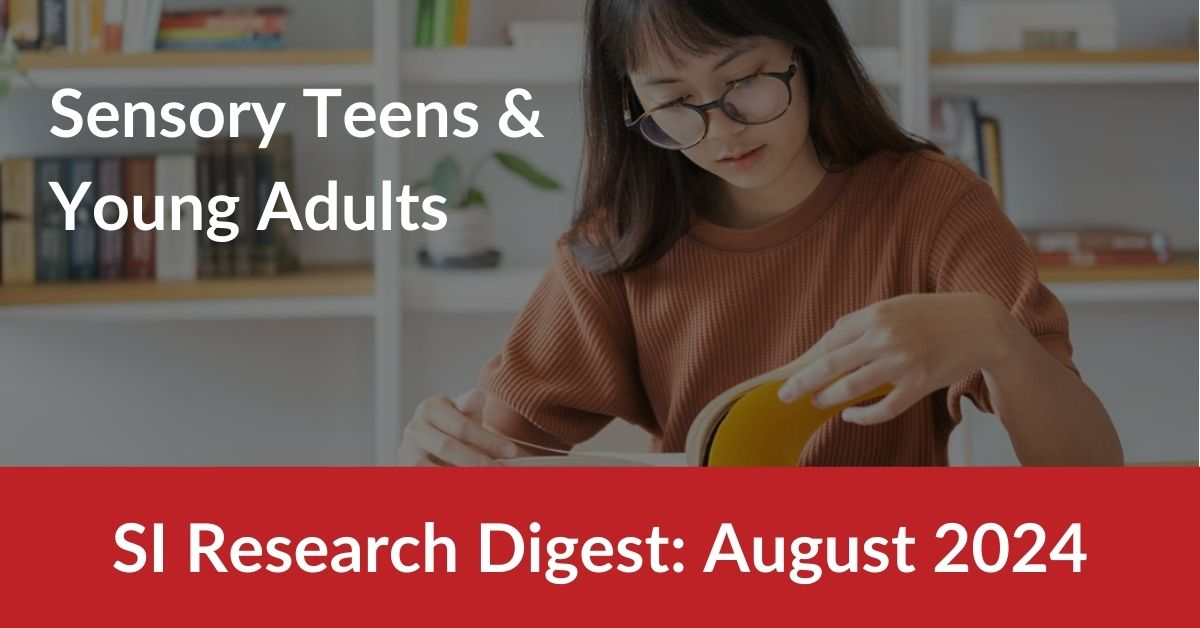SI Research Digest August 2024: Sensory Teens and Young Adults
By Sensory Integration Education, 29 July 2024

Each month we take a look at the latest SI research and research of topical interest - this month, we have a focus on sensory teens and young adults.
Convergent Validity of Two Adult Self-report Sensory Scales: Comparing the Adolescent/Adult Sensory Profile and the Sensory Processing Measure 2–Adult Form
This new study investigated the correlation between the sensory processing factors measured by the A/ASP and SPM-2-Adult when completed by the same group of adult participants. The researchers found a strong positive correlation between Low Registration, Sensory Sensitivity, and Sensation Avoiding quadrant subscales and all nine of the SPM-2-Adult subscales.
Sensory Alterations in Post-traumatic Stress Disorder
This recent study investigated the impact of traumatic experiences and post-traumatic stress on sensory processing. The researchers found that study participants affected by trauma present with sensory processing difficulties and difficulties with distinguishing between threatening and non-threatening stimuli.
Sensory Processing Difficulties in Children and Adolescents with Obsessive-Compulsive and Anxiety Disorders
This study investigated sensory processing differences in Children and Adolescents with Obsessive-Compulsive and Anxiety Disorders. The findings from this study suggest that young people with OCD and anxiety present with significantly more sensory processing difficulties than those who don't.
Emotionally Based School Avoidance in the Aftermath of the COVID-19 Pandemic: Neurodiversity, Agency and Belonging in School
This recent study investigated emotionally based school avoidance (EBSA) in young people following the COVID-19 pandemic. The paper highlights some of the challenges that autistic young people experienced in returning to school and the need for more training in schools to support autistic learners better.
Atypical Sensory Processing in Adolescents with Attention Deficit Hyperactivity Disorder: A Comparative Study
This recent study investigated sensory processing differences in adolescents with ADHD. The researchers found that study participants with ADHD present with sensory differences that impacted their participation in daily activities across the domains of taste/smell, movement, vision, touch, activity level, and hearing as measured on the Adolescent/Adult Sensory Profile.
Sleep Physiology and Neurocognition Among Adolescents With Attention-Deficit/Hyperactivity Disorder
This new study investigated sleep in adolescents with ADHD. The researchers found that in comparison to peers without ADHD, adolescents with ADHD experience more sleep disturbances and recommended that further research is needed to investigate the impact of this on neurocognition.
Proactive Inhibitory Control as a Cognitive Contributor to Social Difficulties in Adolescents with ADHD Traits
This new study investigated cognition in adolescents with clinically elevated ADHD symptoms with and without social difficulties and, in comparison too, with adolescents with ADHD symptoms and autistic adolescents. The researchers found that adolescents with clinically elevated ADHD symptoms who experience social difficulties may represent a distinct sub-group with a different profile of difficulties than those who are Autistic, and those with ADHD who do not experience social difficulties.
Autistic Adults’ Reflections on What Supported Their Transitioning from Secondary School
This new study investigated autistic adults' experiences of factors that supported their transitioning from secondary school. Young people indicated that they valued a holistic neuro-affirming approach and experiences to help them prepare for the social exchanges of adult life.
How Developmental Coordination Disorder Affects Daily Life: The Adolescent Perspective
This recent study investigated the impact of DCD on adolescents. Along with motor difficulties that impact participation of daily activities, the environment also impacted study participants as it influenced the choices available to young people and their patterns of participation.
Balance and Motor Skills Differences Between Children and Teenagers with Autism Spectrum Disorder and Neurotypically Developing
This new cross-sectional study investigated balance and motor coordination in autistic and neurotypical children and teens aged 6-18 years. The researchers found that overall autistic participants presented with lower scores on both the Bruininks-Oseretsky test of Motor Proficiency version 2 short form and the Paediatric Balance Scales.
Whilst the scores suggest a higher rate of motor difficulties in autistic study participants, some study limitations include sample bias and a lack of information on other factors influencing participants’ scores on the tests used.
Relationships between Motor Skills and Academic Achievement in School-Aged Children and Adolescents: A Systematic Review
This recent systematic review investigated the relationship between motor skills and academic achievement in children and adolescents. The review, which consisted of 78 papers, found that both gross and fine motor skills consistently and positively related to overall academic performance. The authors highlighted the importance of supporting children with motor coordination difficulties in school.
Promoting Physical and Mental Health among Children and Adolescents via Gamification—A Conceptual Systematic Review
This recent systematic review investigated the use of gamification to support the mental and physical health of young people. A key finding from this review was that a gamified intervention (e.g an active video game) had positive effects and was helpful in encouraging adolescents to participate in physical activity. Gamified quizzes were also found to be helpful in sharing health information with teens.
Grey Matter Correlates of Attention-Deficit Hyperactivity Disorder in Boys Versus Girls with Sensory Processing Dysfunction
This recent study investigated grey matter correlates of ADHD in boys in comparison to that of girls in teens with sensory differences. The researchers found that greater structural grey matter abnormalities of sensory, limbic, and cerebellar circuits are most involved in the development of ADHD in male study participants whilst in female participants, grey matter abnormalities were mostly observed in the primary visual cortex and primary auditory cortex.
Targeting the Transition Goals of Teens Through Executive Function Support
This article discusses the topic of supporting teens with transitions through addressing executive functions. The authors discuss practical tips including the use of sensory reminders.
| If you’re looking to expand your knowledge of sensory integration and sensory processing, SIE’s Lifelong Learning Programme offers access to all our short courses as well as peer support sessions. Find out more here. |

